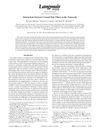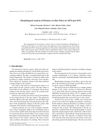 40 citations,
May 2016 in “Proceedings of the National Academy of Sciences of the United States of America”
40 citations,
May 2016 in “Proceedings of the National Academy of Sciences of the United States of America” Changes in keratin make hair follicles stiffer.
 28 citations,
December 2010 in “Langmuir”
28 citations,
December 2010 in “Langmuir” Hair fibers interact through classical forces, which are influenced by treatments and products, important for hair care and other applications.
 19 citations,
July 2018 in “ACS biomaterials science & engineering”
19 citations,
July 2018 in “ACS biomaterials science & engineering” Bleaching and combing damage hair's surface and mechanical properties.
 13 citations,
March 2006 in “International Journal of Cosmetic Science”
13 citations,
March 2006 in “International Journal of Cosmetic Science” The study found that a polymer treatment changes the charge on hair surfaces, making bleached hair smoother and less porous.
4 citations,
April 2018 in “Journal of vacuum science and technology. B, Nanotechnology & microelectronics” The conclusion is that a new method can identify cosmetic residues on hair and match them to their products.
4 citations,
June 2016 in “PubMed” Repeated dyeing and shampooing cause hair color loss and damage.
 3 citations,
November 2021 in “Applied Microscopy”
3 citations,
November 2021 in “Applied Microscopy” Hair microscopy is a simple and cost-effective method to help diagnose systemic diseases in children.
 3 citations,
January 2015 in “Mathematical problems in engineering”
3 citations,
January 2015 in “Mathematical problems in engineering” Hair damage increases significantly with higher temperatures and longer heating times.
 3 citations,
June 2007 in “Journal of Cosmetic Dermatology”
3 citations,
June 2007 in “Journal of Cosmetic Dermatology” Using the right hair care products can improve hair health and help manage hair disorders.
2 citations,
June 2013 in “In Vitro Cellular & Developmental Biology - Animal” Melanocytes from human fetal hair follicles were successfully cultured, showing potential for hair disease research and clinical use.
1 citations,
March 2013 in “PubMed” Glycylglycine makes hair softer by improving alignment and changing hair's internal properties.
1 citations,
November 2003 in “Humana Press eBooks” AFM helps study hair surfaces for dermatology, cosmetics, and forensics.
April 2024 in “Authorea (Authorea)” Understanding the nanoscale structure of skin fibrosis can improve knowledge of wound healing and tissue regeneration.
 December 2023 in “Research Journal of Pharmacy and Technology”
December 2023 in “Research Journal of Pharmacy and Technology” The method ensures Hibiscus rosa-sinensis flower extract is safe and effective for medicinal use.
January 2021 in “Figshare” Finasteride's molecular properties and active sites were identified using computational methods.
 January 2020 in “Química Nova”
January 2020 in “Química Nova” The PW91 method is best for calculating the basic physical and chemical properties of Finasteride, a drug used for prostate issues and hair loss.
33 citations,
November 2007 in “JAT. Journal of applied toxicology/Journal of applied toxicology” Human scalp hair on mice can effectively monitor mercury exposure.
 3 citations,
June 2019 in “Journal of Bangladesh Society of Physiologist”
3 citations,
June 2019 in “Journal of Bangladesh Society of Physiologist” People with hair loss often have lower levels of zinc and copper in their blood.
1 citations,
November 2022 in “Molecules/Molecules online/Molecules annual” Some calcium supplements have more calcium than their labels say, and a few have less.
 8 citations,
June 2023 in “Advanced functional materials”
8 citations,
June 2023 in “Advanced functional materials” Tunable structured metal oxides show promise for various medical treatments due to their versatility and cost-effectiveness.

Deep eutectic solvents can replace toxic solvents in extracting useful compounds for medicines.
97 citations,
January 2005 in “Wear” Human hair and skin friction vary by ethnicity, hair type, and environmental conditions.
25 citations,
May 2019 in “Cosmetics” 18-MEA and cationic surfactants can restore and maintain hair's hydrophobic nature, improving its beauty and feel.
15 citations,
August 2020 in “Analytical chemistry” Hair lipids do not protect against humidity.
 8 citations,
December 2003 in “Materials Research-ibero-american Journal of Materials”
8 citations,
December 2003 in “Materials Research-ibero-american Journal of Materials” Polyquaternium 7® builds up on hair, improving its look and feel, and AFM is good for measuring these changes.
 3 citations,
April 2011 in “Microscopy research and technique”
3 citations,
April 2011 in “Microscopy research and technique” Teratoma hair is similar to scalp hair but has a rougher surface and lower adhesive force.
 1 citations,
January 2017 in “Pharmaceutica Analytica Acta”
1 citations,
January 2017 in “Pharmaceutica Analytica Acta” The research confirmed that certain methods are reliable for standardizing Eclipta alba and ensuring its safety and quality in herbal products.
 September 2024 in “Heliyon”
September 2024 in “Heliyon” Repeated hair dyeing significantly damages hair.
March 2021 in “Juniper Online Journal Material Science” Energy healing treatment improved L-cysteine's stability, solubility, bioavailability, and shelf-life.
18 citations,
December 2010 in “Journal of analytical atomic spectrometry” A new method accurately measures lead levels in hair to assess exposure.
















